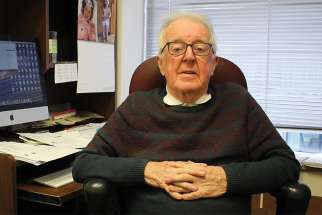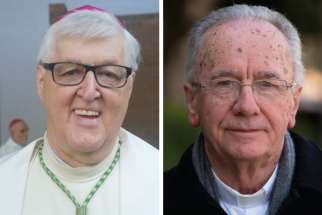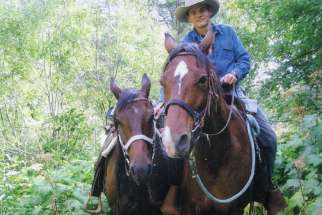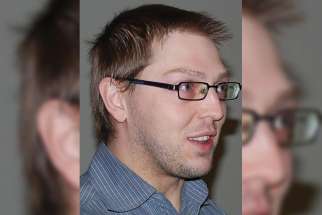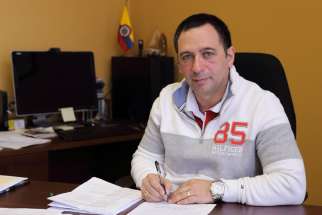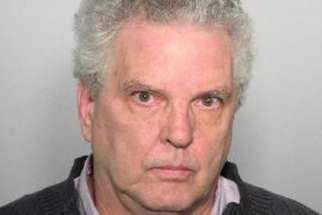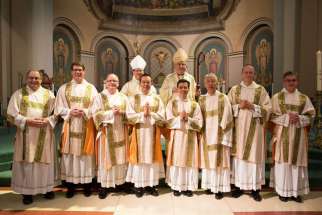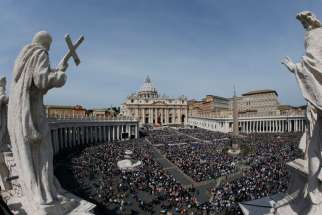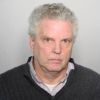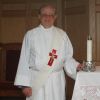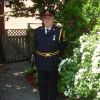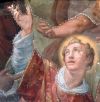Deacon Doyle brought a smile to one and all
If there’s one thing Deacon Peter Doyle always loved to do, it was put a smile on your face. And the earlier in the day the better.
Quebec bishops have ‘open discussion’ on married priests
OTTAWA – The Assembly of Catholic Bishops of Quebec have discussed the ordination of married men to the priesthood, but have reached no conclusions, said the Assembly’s president.
B.C. rancher saddles up for priesthood
VANCOUVER – Living and working with a tight-knit family on a remote B.C. ranch was a recipe for vocation for Ken Anderson who will be ordained a priest this year.
Deacons stay true to vision
When 33 men took the bold step in 1972 to prepare for ordination into the permanent diaconate for the Catholic Church in Canada, they were preparing themselves for ministering to their communities.
QUEBEC CITY - A well-known personality in Colombia, he fled to Canada to stay alive. Uprooted, new to the French language, he lived in precariousness in Quebec City, drawing strength to live from his family and his faith. Now he is in charge of the Latino community of the Archdiocese of Quebec.
Irish bishop seeks to discuss ordaining of married men
DUBLIN - An Irish bishop urged his colleagues to establish a commission to discuss the possibility of ordaining married men.
Bishop Leo O'Reilly of Kilmore also wants the Irish bishops' conference to empower the commission to further study female deacons.
Former deacon gets jail time over child porn charges
MONTREAL - A Catholic deacon who was arrested with more than 100,000 pornographic pictures of children was sentenced Mar. 24 to two years less a day in prison.
Eight ordained to Toronto's permanent diaconate
TORONTO - On May 24 eight men entered St. Paul's Basilica in Toronto only to leave a short time later as the archdiocese's newest deacons.
VATICAN CITY - The number of Catholics in the world and the number of priests, permanent deacons and religious men all increased in 2012, while the number of women in religious orders continued to decline, according to Vatican statistics.
Montreal deacon facing child pornography charges
OTTAWA (CCN) - William Kokesch, a Montreal permanent deacon who served nearly10 years as a communications director for Canada's Catholic bishops, faceschild pornography charges.
Wives are an integral part of a deacon’s ministry
TORONTO - When Barbara and Stephen Barringer decided to announce to their children that he would be working towards becoming a deacon, their son’s immediate comment was, “Oh wonderful. Dad’s always been great at preaching and now they’re going to give him a licence!”
Deaf deacon’s trust in God helps him overcome the odds
TORONTO - There’s no denying that Deacon Kevin Brockerville is a communicator.
When he talks about his wife, he smiles wide. When asked how he balances family and his deacon responsibilities, he jokes about having two ropes tied around his neck, eyes lighting up in laughter. And when he describes the people who have helped him throughout his life, his emotion is clear.
And he communicates all of this while being deaf.
Not able to hear since age three, Brockerville credits his faith with moving him forward. And it all started with a teacher in his hometown in Newfoundland.
“She would always take me to the church,” Brockerville said through an interpreter. “I didn’t really understand what church was. I would sit there and see people kneeling and praying but I didn’t know what that was.”
It was this teacher who also made sure Brockerville received the proper education.
“She found where the school for the deaf was that I could go to,” he said.
The school was in Halifax, and moving there for Brockerville was a necessary step in his spiritual journey.
“There I started understanding,” he said. “They taught religion, so I got the idea about my faith. It’s a struggle for the deaf to understand religion but I’m very happy that I had the education that helped me.”
Brockerville moved back to Newfoundland after school, and met a missionary priest from the United States who could sign.
“My mouth was wide open, I was so shocked,” Brockerville said. “‘You mean there’s a priest that can sign?’ It really inspired my wanting to serve. He’s a priest and he’s serving us.”
By the end of the 1960s, then with a wife, Gertrude, who is hearing impaired but not deaf, and his first child, Brockerville moved to Toronto for work and started attending Holy Name Church at Pape and Danforth, where the deaf ministry in Toronto gathered at the time.
“Everyone was signing and the priest was signing,” Brockerville said. “Wow, it was so powerful to me to see that everyone would come.”
The ministry has since moved to St. Stephen’s Chapel in downtown Toronto, where Brockerville serves as a deacon.
“I just felt that God was calling me to serve the deaf people,” he said about his decision to join the diaconate.
But he described his studies — culminating in his ordination in 1984 — as a “real struggle.”
“I was the only deaf person,” Brockerville said. “It was harder (for me) than (for) the hearing people because I had a hard time understanding the language.”
Brockerville explained this is a common thread for all deaf people in grasping theology, and said homilies have to be very simple when signing.
In the end, though, he made his way through the four years of diaconate study.
“I kept listening with my eyes. I kept watching,” he said. “I know that I struggled. But I had to trust God and I trust Him.”
Today, there are four locations for the deaf ministry in the archdiocese of Toronto: in Toronto, Barrie, Oshawa and Mississauga. Brockerville, who spends his time at the downtown Toronto location, is the only deaf deacon, and so has much responsibility, not only with serving at Mass and giving homilies, but also in helping deaf people with further interpretation of the services.
“Some of the deaf have questions about their faith, and if they’re studying something or reading something, I help them,” Brockerville said.
But this man — who said above his responsibilities in the diaconate and in the deaf ministry is his responsibility to his family — is anything but boastful.
“I don’t look for rewards, I look to serve,” he said. “I just follow the faith. I’m here to serve and I serve the best way I can.”
[issuu width=600 height=360 backgroundColor=%23222222 documentId=120910160538-19846c86f786424e98153821bd480e84 name=diaconate username=catholicregister tag=anniversary unit=px v=2]
Deacon trades street beat for hospital ministry
TORONTO - For nearly 30 years, George Jurenas patrolled the streets of Toronto, keeping people safe. Today, this retired cop patrols the hallways of hospitals, giving people hope.
Jurenas was ordained a deacon in 2008, and has spent most of his time since as a chaplain at Trillium Health Centre in Mississauga and with the Peel Regional Police. And while he said his main inspiration for entering the diaconate was his own parish deacon, he recognizes his years with the Toronto Police Service showed him he had what it takes.
“People would call me Father Confessor,” Jurenas laughed. “(After I arrested people) they’d be sitting in the back of the cruiser and just seemed to open up to me naturally.”
Meeting so many different kinds of people in his profession, Jurenas said, taught him some valuable lessons.
“Over the years, what I found was people aren’t evil,” he said. “No one wants to live on the streets, no one wants to rob a bank, no one wants to put a needle in their arm. There’s usually a reason why they did what they did. There’s a hurt or a pain or something behind that action that for one reason or another placed them there.”
It’s a lesson that has helped him in many situations, like once when he was faced with a patient who, to put it lightly, did not care for his help.
“I introduced myself, said hi, I’m the chaplain, and I basically get, ‘eff off,’ ” Jurenas said.
“I said hey, no problem, God bless you. But you never know. Someone could be in a real bad place… and it’s not that they don’t ever want to talk to you, it’s just at that time.”
Jurenas never gave up on this man, and eventually they were able to turn a corner. But he’s not always so calm and collected, especially working in the palliative care ward. And it is in showing his true emotions that Jurenas sees the biggest difference between his former job and current work.
“I don’t have to pretend to be tough,” Jurenas said. “I can actually cry with people. There is strength as showing your weakness. As an officer, you (have to) play … tough, and there’s a reason for it. If you act mushy people will walk all over you.
“As an officer you’re always standing behind this façade. I’m tough, I’m in control. Then you realize none of us are really in control.”
This hit close to home for Jurenas when he was diagnosed with prostate and bladder cancer himself before becoming a deacon. He underwent an operation and radiation therapy and is now in remission, but he said the experience gave him insight into what people are feeling and going through in hospitals.
“I’ve laid in that bed,” Jurenas said. “No matter what faith you are, we’re all going through the same fears, the same worries and the same pains when we’re lying in that hospital bed.”
Jurenas uses this kind of non-denominational approach to spirituality in his chaplaincy work.
“For me as a Catholic deacon, it’s really neat when I do go visit people from other faiths, whether it be Muslim, Sikh, Hindu, you name it,” Jurenas said.
“We meet together at a certain spiritual, emotional place. Some people say does it weaken your faith? I always tell them if anything, it strengthens my faith. There’s a face of Christ in all of us.”
Jurenas saw this as particularly true when he experienced what he described as a miracle — a man who was told he had months to live walked out of the hospital a year and a half later. Jurenas and the man’s wife, a Muslim woman, had been praying together every week, he with his rosary, she with her amber beads.
“There’s a sense of respect of each other, even though we’re from different faiths and backgrounds,” Jurenas said. “It just shows you when we concentrate on what we have in common, Christ finds a way.”
Jurenas has also found humour in many situations, such as the time he came across a patient and recognized him as a former biker — one whom he had arrested at least half a dozen times in downtown Toronto.
“I used to tell him, you’re not really good at (being a criminal),” Jurenas laughed. “If (I), this beat cop, can arrest you half a dozen times, you should probably look for another line of work!”
Even former arrestees, Jurenas looked to help.
“Here’s a guy, a big feared biker. When he’d walk down the street people would move out of his way,” Jurenas said. “And all of a sudden he’s like a baby, wearing a diaper, can’t really leave the bed. It really affected him emotionally, that self-esteem drop.”
And so Jurenas went out and bought this man Harley Davidson stickers for his wheelchair.
“It was just beautiful to see, he went from this depressed state to laughing and joking,” Jurenas said. “Last thing I heard he’s at a long-term care facility and he’s scooting around.”
But ever humble, this devoted husband and father of four would never take too much credit.
“I’m basically a mirror, and I just show what you have inside of you,” he said. “At the end of the day you have to realize you’re not a superhero, you’re not a saviour. You’re just a very mortal human being.
“You do what do can.”
[issuu width=600 height=360 backgroundColor=%23222222 documentId=120910160538-19846c86f786424e98153821bd480e84 name=diaconate username=catholicregister tag=anniversary unit=px v=2]
Deacons have been a part of the Church since earliest days
Early Scripture makes reference to a form of the diaconate
This month marks the 40th anniversary of the arrival of the diaconate in English Canada. But the history of the diaconate actually dates back to the earliest days of the Church.
The first mention of the diaconate comes right out of Scripture, said Deacon Peter Lovrick, director of the formation program for the diaconate at Toronto's St. Augustine's Seminary, who pointed to references from St. Paul in Romans, Corinthians and Timothy in the New Testament.
But the most substantive reference to the diaconate is Acts 6:2-7, which directly refers to St. Stephen as the first deacon:
"And the twelve called together the whole community of the disciples and said, 'It is not right that we should neglect the word of God in order to wait on tables. Therefore, friends, select from among yourselves seven men of good standing, full of the Spirit and of wisdom, whom we may appoint to this task, while we, for our part, will devote ourselves to prayer and to serving the word.'
"What they said pleased the whole community, and they chose Stephen, a man full of faith and the Holy Spirit, together with Philip, Prochorus, Nicanor, Timon, Parmenas and Nicolaus, a proselyte of Antioch.
"They had these men stand before the apostles, who prayed and laid their hands on them."
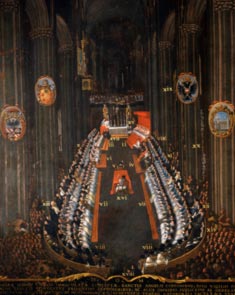
The closing session of the Council of Trent is depicted in an illustration from the 17th century.
- CNS photo/courtesy of Art Resource
Lovrick said some scholars dispute whether these words are specifically pointing towards a diaconate, though Stephen went on to become the first martyr of Christianity, and his name lives on as the patron saint of deacons.
"Many of the early fathers of the Church wrote about deacons," Lovrick said. "Deacons in the early Church had a pretty prominent role, eventually taking upon administrative and juridical positions in the Church.
"They were very closely connected to the bishops… but they were a distinct group. They were not priests."
After several centuries of deacons working closely with bishops, things started to change, said Lovrick.
"They brought in the various orders," he said. "It began to look that the deacon was a step to be a priest, and it became that way."
Today, there is a transitional diaconate, the step immediately before one becomes a priest, and the permanent diaconate, for those who do not go on to the priesthood. But before these were established as distinct ideas, the permanent diaconate began to wane by 1000, and soon disappeared in the western Church.
The Council of Trent, a council of ecclesiastical and theological experts who met in Trent to discuss important matters in the Catholic Church, was the first occasion after the original decline of the diaconate that the idea of a renewal was brought up. In 1563, during the council's 23rd session, came the call for a restoration of the diaconate, a movement that was stirred in the Eastern Catholic Churches, where the permanent diaconate had not been quite as weakened.
"The original proposal that went into the council was very ambitious and spoke a great deal about the separate order," Lovrick said. "But there were other things going on in Europe. Nothing really happened until the 20th century.
"For 500 years, (the restoration) was on hold."
Of all places for the diaconate to begin its revival, it was the Nazi concentration camp Dachau during the Second World War. A small number of Catholic priests were detained there, in a cellblock called the "priest block." And it was there the rumblings of a new diaconate were formulated. Frs. Otto Pies and Wilhelm Schamoni spearheaded the movement.
"They saw Europe crumbling around them," Lovrick said. "They saw the ravages of war, they saw the attack on the Church.
"They had faith that we were going to get through this, but when we got through this, we would be in the ruins and things would need to be rebuilt."
These priests began to write about bringing back the diaconate envisioned at Trent, about how deacons could help the priesthood restore faith after the war. These thoughts were published, and another mind began to write about similar ideas — Fr. Karl Rahner, the great theologian.
"Rahner talked about how there were lots of people in the world doing diaconal things, but they weren't given the sacramental grace of ordination to do it," Lovrick said. "It only made sense to empower people to do what you were asking them to do. That was his basic argument."
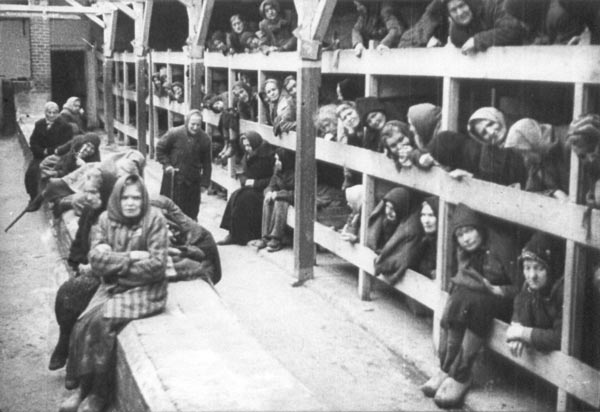
The Dachau concentration camp was the unlikely place where talk about the revival of the permanent diaconate evolved. - CNS photo/Reuters
Meanwhile, a charitable movement in Germany called Caritas was getting very involved with restoring the diaconate by publishing articles and hosting open forums for discussion. By 1962, efforts by several groups and individuals came together with a petition for Pope John XXIII, which made its claim:
"Well-known theologians have studied the matter from the historical, theological and practical points of view, and have arrived at the consensus that the proposed restoration (1) is possible, (2) would bear great fruit in the interior life of the Church, and (3) would do much to foster the cause of unity among Christians which Christ so dearly desires."
What followed were seven questions and potential issues of reinstating deacons, and reasons and answers behind all of them; this petition set into motion the events of the Second Vatican Council. Vatican II, much like the Council of Trent, discussed the Church and its place in the modern world. It ran from 1962 to 1965, and the restoration of the diaconate was a solid fixture of discussion.
But the council did something that Trent didn't — it followed through on the diaconate discussion.
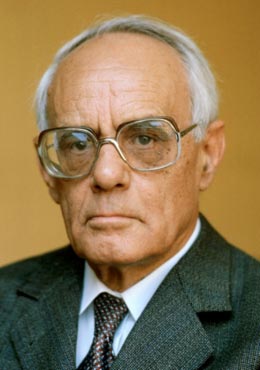
"In the (Second) Vatican (Council), 101 propositions were specifically on the diaconate," Lovrick said. "There was a lot of back and forth, some cardinals in support… others against it. But by 1964, the dogmatic document of the Church, Lumen Gentium, (had a) very clear section on the deacons calling for the restoration on the diaconate."
Four years later, in 1968, came the first ordination ceremonies of deacons since the Reformation — fittingly, in Germany. Several other countries, including Colombia, followed suit, so that by 1970 there were almost 100 permanent deacons around the world.
The Canadian Conference of Catholic Bishops met in Winnipeg in 1968 and voted overwhelmingly to ask Rome for permission to restore the diaconate in Canada. By 1969 it was granted.
Toronto came aboard in 1972, thus forming the first class of permanent deacons in the archdiocese of Toronto, who were ordained two years later. To date, 272 men have been ordained deacons in Toronto.
[issuu width=600 height=360 backgroundColor=%23222222 documentId=120910160538-19846c86f786424e98153821bd480e84 name=diaconate username=catholicregister tag=anniversary unit=px v=2]



